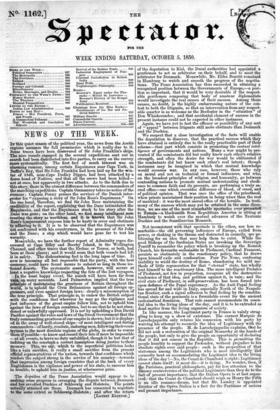The deputies of the Peace Association would appear to be
making some progress in arranging the dispute between. Denmark and her revolted Duchies of Schleswig and Holstein. The points actually attained are these. Denmark has consented to negotiate to the same extent as Schleswig-Holstein; and after the return of the deputation to Kiel, the Ducal authorities had appointed a gentleman to act as arbitrator on their behalf, and to meet the arbitrator for Denmark. Meanwhile, Mr. Elihu Burritt remained in Hamburg to watch and smooth the progress of the negotia- tions. The Peace Association has thus succeeded in attaining a recognized position between the Governments of Europe,—a posi- tion so important, that it would be very desirable if the respect- able gentlemen composing that body of amateur diplomatists would investigate the real causes of their success. Among those causes, no doubt, is the highly embarrassing nature of the con- test to both the litigants, so that an intervention from any respect- able quarter is as welcome as the Beefeater in the " situation " of Don Whiskerandos ; and that accidental element of success in the present instance could not be expected in other instances.
Again, we have yet to test the efficacy or possibility of any sort of appeal" between litigants still more obstinate than Denmark and the Duchies.
We suspect that a close investigation of the facts will enable the deputation to discover, that the practical success which they have attained is entirely due to the really practicable part of their scheme—that part which consists in promoting the mutual Intel- ligence of governments and nations. Many a war might be pre- vented if the combatants did but really know each other's relative strength, and often the desire for war would be obliterated if the combatants did but know each other's real intent; though instance maybe be imagined in which that mutual knowledge would occasion war. In any case, however, those who rely on moral and not on technical or formal influences, and who, on the broadest principles of religion and humanity, go between contending nations to promote mutual understanding and obedi- ence to common faith and its precepts, are performing a truly sa- cred office—one which overrides difference of blood, of creed, and of political opinion. That was once the office of the priesthood, when priests maintained their position in being wiser than the rest of mankind : it was the most sacred office of the heralds. In testi- mony of the success which may yet be attained in the same direc- tion, we see one of the most remarkable spectacles ever presented to Europe—a blacksmith from Republican America is sitting at Hamburg to watch over the mutual advances of the Teutonic Duchies and the Scandinavian Monarch.


























